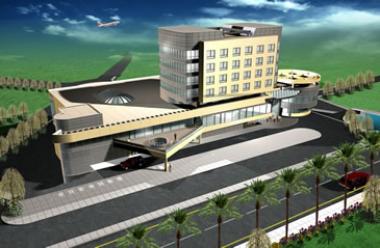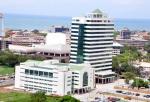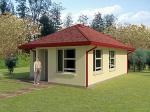Ghana's property market outlook upbeat
 An artist’s impression of Marina Mall, Accra’s next entrant onto the formal retail scene.
An artist’s impression of Marina Mall, Accra’s next entrant onto the formal retail scene.
The prognosis for Africa’s projected economic growth is positive, as commonly reported in the media. At a time when western economies are faltering, the positive statistics make particularly attractive reading.
Giving analysis at Ghana's Property Market, Florence Menson, JHI Ghana’s Centre Manager of Marina Mall in Accra said, “International investors persuaded of the merits of Africa investment will still be careful to minimise their risks, which leads us to Ghana. The death of President John Atta Mills in July this year (2012) was mentioned in news bulletins around the world but did not become a cause for political unease. That it didn’t should be seen as a fitting tribute to him. Power passed to John Dramani Mahama without fuss and was seen as another positive indicator of Ghana’s stability.”
In 2011, Ghana was at the top of the world economic growth charts with a whopping 14.4 percent, boosted by new oil production and helped by the construction sector. Those dizzy heights of double-digit growth may be a one-off, with oil production reaching a plateau in 2012, but Ghana is expected to still achieve around 7.5 percent in 2012 and again in 2013.
Ghana’s middle-income status and oil receipts have provided the country with the fiscal space to seek non-concessional sources of finance. In August 2011, the Ghanaian parliament approved a USD 3 billion loan from the China Development Bank. This facility is the largest ever secured by Ghana and will be used to finance its infrastructure gap.
Says Menson: “This influx of funding will need to be spent wisely and governed by a framework. And while foreign investment is increasing to record highs, there are, however, bumps in the road ahead. The value of the Cedi has plummeted from below 1.5 to the Dollar to almost 2 Cedis to the Dollar over the past year. That drop has made imports more expensive and inflation has risen to around 10 percent. Ghana’s current account deficit is widening due to higher import growth and a large increase in profit repatriation by extractive industries. Investors have been moving their funds out of the country amid short-term uncertainties linked to the election cycle.”
CURRENT RETAIL REAL ESTATE ENVIRONMENT
Comments William Bobie, executive director, Assenta Real Estate Investment Managers: “According to a World Bank classification, on 1 July 2011 Ghana moved from a low-income to lower middle-income status. A gross national income of $1 571 was achieved in 2011, up 44 percent from 2009 levels per a Ghana Statistical survey. The new phenomenon of a middle class, plus the country’s reputation for political and economic stability and cultural tolerance has rapidly revolutionised the retail property market in recent years.
“Dedicated modern retail malls still account for a relatively small proportion of the retail market. Accra, the country’s capital, is the main retail hub for international retailers and home to the modern shopping malls in operation. Additionally, it has a diverse and buoyant informal retail landscape.”
He says A&C Square in 2005, followed by Accra Mall in 2007, set the pace for modern retailing. A&C Square in the East Legon area of Accra is largely a neighbourhood centre with a recent addition of substantial office space. Accra Mall changed the face of retail considerably with 21 000sqm of lettable area, anchored by Shoprite and Game.
“The success of A&C Square in East Legon has confirmed the need for neighbourhood retail centres in Accra. Melcom and Maxmart, local general merchant retail stores, have capitalised on this emerging demand by opening stores in almost all the major areas of Accra. Koala, a local grocery retailer, has also responded to this trend by recently opening another shop in the Airport Residential Area to add to its flagship outlet in Osu. On a regional level, Kumasi and Takoradi, the next two most populous cities in Ghana, have no formal retail centres even though the fundamentals look right. There is a huge opportunity for first time movers to develop shopping centres in these regions,” says Bobie.
SPACE SUPPLY AND DEVELOPMENT
With Accra Mall and A&C being the only formal retail centres available in the market, occupancy rates are near 100 percent. Movenpick Hotel’s 2 000 sqm retail space offering 26 shop units is also fully occupied by a variety of boutique shops while Shoprite’s solus unit on the western corridor of Accra is also self-occupied with no available space to let.
Says Bobie: “Although there is a high demand for retail space from both foreign and local occupiers, supply of space has been sluggish. With a growing population of 2.5 million plus in Accra, the city has capacity for more retail centres to augment the current 30 000sqm of formal retail space. Since the completion of Accra Mall in 2007, surprisingly no formal retail shopping mall has been built.” However, a number of small to medium schemes are under construction in Accra, including retail and office developments of Marina Mall, Nester Square, One Airport Square and Icon House in the Airport area; The Octagon in Ridge; plus the Oxford Street Mall and hotel development in Oxford Street, in Osu.
Adds Menson: “Notable inclusions are Oxford Street Mall and Marina Mall, which are both expected to complete in the coming months, and One Airport Square, an ambitious green star compliant project that will set the bar for environmental standards. In addition, numerous pipeline projects are in the planning stages. These include some sizeable developments: West Hills, Project Sunrise and Gold Coast City in Accra; Apolonia in Tema; King City in Takoradi (all mixed-use developments); Accra Mall extension retail development in Accra, and various developments in Kumasi. West Hills Mall, if completed by 2014 is anticipated to be the largest purpose built mall in Accra offering about 26 000sqm.
Bobie says the retail occupier market has transformed in the last seven years with the entry of international retailers such as Shoprite, Game, Bata, Hi-sense, Mr Price, Woolworths, TM Lewin, and Stellar Deluxe, while KFC and Deli France are recent new additions to enter the Ghanaian market.
“South African retailers currently dominate the international retailers but there are clear signs that European and American retailers are also eyeing the market and with the right space we believe the market will become competitive and diverse in the very near future.
“The strong demand for retail space is impacting positively on retail rentals. Using Accra Mall as the benchmark in 2007, retail rents have seen phenomenal growth from $20 per square metre per month to current levels in new developments of above $45 per square metre. The retail property investment market is still at its infancy stage. The sale of Actis’s 85 percent stake in Accra Mall to a consortium of South African investors including Sanlam and Atterbury is welcome news and underlines Ghana’s position as an investment destination for global investors seeking diversification in their real estate portfolios,” he adds.
FUTURE PROSPECTS
Menson says Ghana has a relatively open society, with a media and a public debate that is able to openly challenge politicians. There are more than 100 private radio stations and over 20 privately-owned newspapers in Ghana. The Freedom of Information Bill is slowly winding its way through parliament. This is perhaps where Ghana can distinguish itself from some of the other African economies that boomed over the past 20 years or so, including many which did so on the back of oil wealth, but were unable to sustain their development because their democratic foundations were not solid.
Ghana measures up well to its African counterparts in terms of civil liberty, political rights, and ease of doing business. The country is not without issues but since 2000 there have been two successful transfers of power and the 1994/95 land disputes in the north appear a long way in history.
Adds Menson: “Barack Obama once hailed Ghana as a “model for democracy.” This will be put to the test in December this year (2012) when elections take place. Most Ghanaians believe that democracy is well-entrenched and security and peace will prevail. If this is so then Ghana appears set to benefit from increased investment in its real estate and remain near the top of the shopping list for investors in Africa.”


















